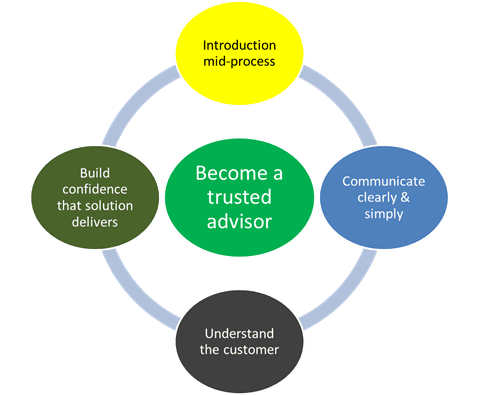B2B innovation is a two-edged sword, improving enterprise business opportunities while increasing sales complexity. Technology delivers better products but makes them harder to understand, apply and explain. Implementations are more customized as B2B solutions are increasingly tailored to customer specifics. Decision-making by customer committee adds to the degree of difficulty. As a result, one-on-one selling is becoming a distant memory as the lone-wolf breed of account rep is replaced by sales teams with the relevant mix of knowledge, skills and experience.
Presales professionals are central to this sales transformation. Presales roles have many job titles including presales, technical sales, subject matter experts, solution consultants and sales engineers. In healthcare, presales functions include medical science liaisons, medical affairs, market access and health economists. Presales team members are typically responsible for providing in-depth technical and other product information. They often tailor a package or solution to customer specifics. Invariably, they engage directly with customers. Some product managers play a presales role part-time. Some business development professionals have a major presales role.
Great presales professionals understand the technical dimensions of their solutions and anticipate an account’s opportunities and challenges in a successful purchase. Normally entering the sales picture partway through the sales cycle, presales injects technical and implementation expertise into customer interactions.
A study by a McKinsey team published in the Harvard Business Review found that the payoffs from augmenting presales are a 5-point improvement in conversion rates, a 6-13% improvement in revenue, and a 10-20% improvement in the speed of moving prospects through the sales process. They observe that presales can account for up to 30-50% of commercial headcount in many organizations. Yet, regardless of sheer numbers, presales professionals tend to be a scarce and expensive resource.
 The Challenges of Presales. A specialized presales role starts with two inherent challenges. First, entering a customer conversation in the middle of the sales process creates the risk of discontinuity and the possible appearance of uncoordinated team members out of synch with previous conversations. At the stage when presales is introduced, a thorough background briefing on the customer organization, people and previous dialog is required. But it takes more than data transfer to avoid chaos. Collaborative, customer-specific call preparation and meeting planning are essential in crystalizing team member roles and tactical objectives. Sales-presales teamwork is necessary to make the introduction of presales into a pre-existing relationship seamless and effective.
The Challenges of Presales. A specialized presales role starts with two inherent challenges. First, entering a customer conversation in the middle of the sales process creates the risk of discontinuity and the possible appearance of uncoordinated team members out of synch with previous conversations. At the stage when presales is introduced, a thorough background briefing on the customer organization, people and previous dialog is required. But it takes more than data transfer to avoid chaos. Collaborative, customer-specific call preparation and meeting planning are essential in crystalizing team member roles and tactical objectives. Sales-presales teamwork is necessary to make the introduction of presales into a pre-existing relationship seamless and effective.
Second, it goes without saying for a specialized role, that presales has to have technical communication skills. For a start, presales must be able to understand the product or solution, how it applies to customers and how it makes a customer successful. This technical, engineering or subject matter expertise is always important in screening for presales professionals, but communication talents are usually more important in choosing between candidates and in evaluating their performance. A presales rep unable to articulate technical information and deployment experience clearly and understandably is likely to fail fast. A good presales professional needs to be enough of a geek to understand the relevant content but enough of a communicator to connect and communicate clearly with non-geeks.
The bar for a great presales professional starts pretty high, but beyond these two basic challenges most B2B organizations have interrelated expectations of presales professionals that require three additional presales capabilities:
- Understand the individual customer. For all their content expertise, great presales professionals excel by identifying, understanding and addressing specific customers’ needs, problems and opportunities. This is critical if presales is going to be effective in tailoring and customizing a complex solution to customer specifics. But it is just as important in building credibility fast with stakeholders within a target account. Buyer executives, when surveyed, say repeatedly that effective meetings with vendors are those where the vendor shows that they understand the customer’s business. Understanding the customer should be presales’ strong suit.
That said, empathy and listening are not proficiencies that come naturally to the average geek. They are capabilities that need to be developed with training, content and experience. Good call preparation can help generate useful initial customer intelligence. But that information is best used by presales not by presenting, demonstrating or showing off in a meeting, but by using it to provide prompts that get the customer talking. Turning a presentation into a conversation about the customer’s business engages a sponsor or a stakeholder and sets the customer at ease. Starting with an engaged conversation, it becomes natural for presales to interject planned and opportunistic discovery questions and it becomes more natural for the customer to be forthcoming with relevant information. - Build confidence that a solution will deliver. At some point, every B2B customer will challenge a sales team with some form of the question, “Will this solution actually work for me?” Great sales reps build customer confidence as part of their early sales process, but they can go only so far given their job description for any complex product or solution. The challenge of any complex solution sale is to get customer stakeholder buy-in that the product or solution will meet expectations, has delivered results for others in practice and will be successful for that customer.
To be effective in a meeting, a presales professional needs, at a minimum, to be able to handle technical product-centric questions that come from technically inclined customer stakeholders. Presales also should manage and guide customer expectations to a set of achievable outcomes. This can be challenging if initial expectations are unrealistic due to customer misimpressions or overpromising by sales.
But the central presales objective with a broad customer audience is to connect persuasively the product or solution to real customer benefits and realizable customer value. Benefits and value cut through technical mumbo jumbo and help manage expectations. Customer confidence can be built by using experience, anecdotes or case studies from other similar customers who have already succeeded. As part of a solution customization process, a good presales professional ties customer specifics to a solution configuration by pointing to other customer experiences as they provide practical implementation guidance and solution recommendations. Crystalizing these experiences with quantitative benefits realized and quantitative value created provides a strong focal point for building confidence in the likelihood that a solution will deliver results. - Become a trusted advisor. It goes without saying that the best sales reps are great at building interpersonal relationships. But it is no secret and no surprise to any B2B customer that sales reps have commissions at stake and will be pushing to close deals. Even as great reps tackle and resolve customer skepticism about their alignment of interests with customer stakeholders, there is a distinct role within most sales teams for another team member with deeper product, customer and solution understanding.
Presales has the opportunity to play a different part and to build a complementary relationship to sales. Functionally, presales is naturally positioned to be perceived by customer stakeholders as more objective, more customer-centric and better aligned with the customer’s ultimate success. Even if presales eventually hands off to implementation, service, support and other members of a post-sales team, presales is the customer success representative prior to a deal closing. Presales can have a different kind of conversation with a deeper product and customer understanding, in designing and promoting the appropriateness of a tailored solution.
The best presales professionals are invariably great at building trusted advisory relationships with key people at target accounts. These relationships provide sales teams with more than one point of customer leverage when the going gets tough in advancing a buying process to the goal line and beyond.
 Addressing Presales Challenges. The diagram attempts to capture and summarize these presales challenges. To consistently address them, a presales organization needs the right skills and tools. In subsequent blogs we will look more closely at presales processes and objectives and how to apply interactive Value Propositions effectively.
Addressing Presales Challenges. The diagram attempts to capture and summarize these presales challenges. To consistently address them, a presales organization needs the right skills and tools. In subsequent blogs we will look more closely at presales processes and objectives and how to apply interactive Value Propositions effectively.
Value Propositions help teams address sales challenges at many points of the B2B sales cycle. A good Value Proposition shows clearly the three or four ways that our product or solution is better. A great Value Proposition takes the further step of quantifying what that differentiation is worth to the customer.
The use of Value Propositions by presales addresses the specific challenges shown in the diagram effectively:
- Value Propositions can and should be a focal point of call preparation and planning for presales. This helps with a mid-process introduction of presales into a relationship by guiding critical call preparation questions, highlighting important elements of previous conversations and drawing teams toward meeting objectives and the bottom line for identified sponsors and stakeholders.
- Value Propositions help communicate complexity clearly and simply. Some customer stakeholders may want answers in technospeak, but translating technical benefits into quantified customer value keeps a broader customer audience engaged in a language they can understand with an objective – customer profitability – that they care about.
- A Value Proposition helps presales to understand the customer. By focusing on the customer’s business results, a Value Proposition is customer-centric instead of product-centric. By relating a product or solution to the customer’s business, it helps presales build credibility early by engaging in conversations about the customer understands. In customizing a Value Proposition to the specific business assumptions for a customer, it helps in the discovery process and helps to tailor a solution to the specific needs of a customer. By reaching customer consensus on the right assumptions for that customer, the Value Proposition becomes a conclusion that the customer owns.
- A Value Proposition builds customer confidence that a solution will deliver. A Value Proposition starts with the experience of business results realized by other customers, whether named or not. The process of customizing that business case, of refining assumptions with customer stakeholders, helps to validate the probability of business success, as customers buy into the results based on those assumptions.
- A Value Proposition supports the presales role as a trusted advisor. Conversations about the customer’s business, uncovering business details based on value, tailoring both the solution and the value proposition to customer specifics all point the way toward presales alignment with customer interests. A presales professional who builds consensus for a Value Proposition can get presales into a zone of being positioned as a member of the customer team with commitment to the customer’s business success.
Value Propositions support effective presales execution. A Value Proposition shared with and owned by the customer becomes a validated cornerstone of a customer consensus to buy, based on acquired trust in the sales team. A consensus Value Proposition is a useful tool, not just for presales, but in the hands of sponsors through a customer approval process, as they make a compelling internal business case for buying our solution at a fair price.

